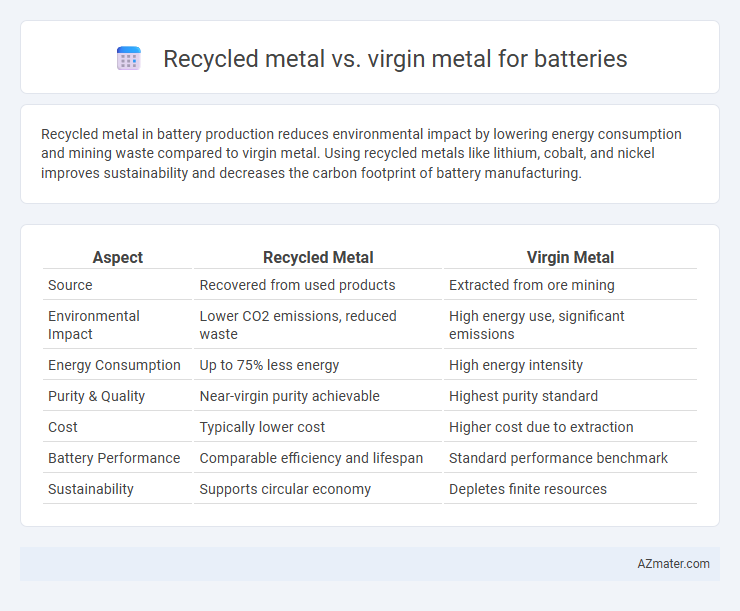Recycled metal in battery production reduces environmental impact by lowering energy consumption and mining waste compared to virgin metal. Using recycled metals like lithium, cobalt, and nickel improves sustainability and decreases the carbon footprint of battery manufacturing.
Table of Comparison
| Aspect | Recycled Metal | Virgin Metal |
|---|---|---|
| Source | Recovered from used products | Extracted from ore mining |
| Environmental Impact | Lower CO2 emissions, reduced waste | High energy use, significant emissions |
| Energy Consumption | Up to 75% less energy | High energy intensity |
| Purity & Quality | Near-virgin purity achievable | Highest purity standard |
| Cost | Typically lower cost | Higher cost due to extraction |
| Battery Performance | Comparable efficiency and lifespan | Standard performance benchmark |
| Sustainability | Supports circular economy | Depletes finite resources |
Introduction to Recycled vs Virgin Metal in Battery Manufacturing
Recycled metal in battery manufacturing offers a sustainable alternative to virgin metal by reducing the demand for newly mined raw materials such as lithium, cobalt, and nickel, which are critical for battery performance. The use of recycled metals helps lower environmental impact and energy consumption during production while maintaining comparable electrochemical properties essential for battery efficiency. Advances in recycling technologies enable the recovery of high-purity metals, making recycled materials a viable and cost-effective solution in the evolving battery supply chain.
Environmental Impact: Recycled Metal vs Virgin Metal
Recycled metal significantly reduces environmental impact compared to virgin metal by lowering energy consumption by up to 85% during processing and minimizing carbon emissions. The extraction of virgin metal involves extensive mining operations that contribute to habitat destruction, soil erosion, and water pollution. Utilizing recycled materials in battery production supports resource conservation and decreases the ecological footprint associated with metal procurement.
Energy Consumption Differences
Recycled metal in battery production significantly reduces energy consumption compared to virgin metal extraction, with studies showing up to 90% less energy required for materials like aluminum and lithium. This energy efficiency arises from bypassing ore mining and refining processes, which are highly energy-intensive and emit substantial greenhouse gases. Utilizing recycled metals not only lowers production costs but also supports sustainable battery manufacturing by minimizing the carbon footprint associated with raw material acquisition.
Resource Scarcity and Sustainability
Recycled metal significantly reduces dependence on scarce virgin metal resources like lithium, cobalt, and nickel, which are critical for battery production and subject to geopolitical supply constraints. Utilizing recycled metals enhances sustainability by lowering energy consumption and greenhouse gas emissions compared to mining and refining virgin metals. This closed-loop approach supports circular economy goals and mitigates environmental impacts associated with battery manufacturing.
Economic Benefits and Cost Analysis
Recycled metal in battery production offers significant economic benefits by reducing raw material costs and minimizing energy consumption, which can lower manufacturing expenses by up to 40% compared to virgin metals. The cost analysis reveals that recycled metals like lithium, cobalt, and nickel retain high purity levels while avoiding the environmental and regulatory costs associated with mining, enhancing overall profit margins. Utilizing recycled metals contributes to a more sustainable supply chain, stabilizing prices and reducing vulnerability to market fluctuations impacting virgin metal sourcing.
Purity and Performance in Battery Applications
Recycled metal in battery manufacturing often achieves high purity levels through advanced refining techniques, closely matching virgin metal standards critical for optimal battery performance. While virgin metals provide consistent chemical composition and minimal impurities, recycled metals contribute to sustainable sourcing without significant compromise in electrochemical efficiency. Both materials impact battery lifespan and energy density, but innovations in purification have increasingly minimized the performance gap between recycled and virgin metals.
Lifecycle Assessment and Carbon Footprint
Recycled metal used in battery production significantly reduces the lifecycle environmental impact compared to virgin metal by minimizing mining and processing emissions. Lifecycle assessments show recycled metals can lower carbon footprints by up to 70%, primarily due to decreased energy consumption during material extraction and refinement. Incorporating recycled metals in battery manufacturing supports sustainable supply chains and reduces greenhouse gas emissions over the product's entire lifecycle.
Supply Chain Reliability and Security
Recycled metal offers enhanced supply chain reliability by reducing dependency on geographically concentrated virgin metal sources, mitigating risks from political instability and export restrictions. Virgin metals often involve complex extraction processes prone to environmental regulations and labor issues, which can disrupt supply consistency. Incorporating recycled metals into battery production secures a more sustainable and stable material flow, essential for meeting growing global demand while minimizing supply chain vulnerabilities.
Regulatory and Industry Standards
Regulatory frameworks such as the EU Battery Directive and the U.S. EPA emphasize the use of recycled metal to minimize environmental impact and promote circular economy principles in battery manufacturing. Industry standards from organizations like the International Electrotechnical Commission (IEC) mandate stringent material purity and performance requirements, often influencing the choice between recycled and virgin metals. Compliance with these regulations ensures safer chemical composition, reduced carbon footprint, and improved sustainability across the battery supply chain.
Future Trends in Metal Sourcing for Batteries
Recycled metal is rapidly gaining traction in battery manufacturing due to its lower environmental impact and reduced reliance on mining, addressing critical sustainability concerns. Future trends indicate a shift towards circular economy models where recovered lithium, cobalt, and nickel from end-of-life batteries will significantly supplement virgin metal inputs. Advancements in recycling technologies and stricter regulatory frameworks will further drive the integration of recycled metals, optimizing resource efficiency and cost-effectiveness in battery supply chains.

Infographic: Recycled metal vs Virgin metal for Battery
 azmater.com
azmater.com